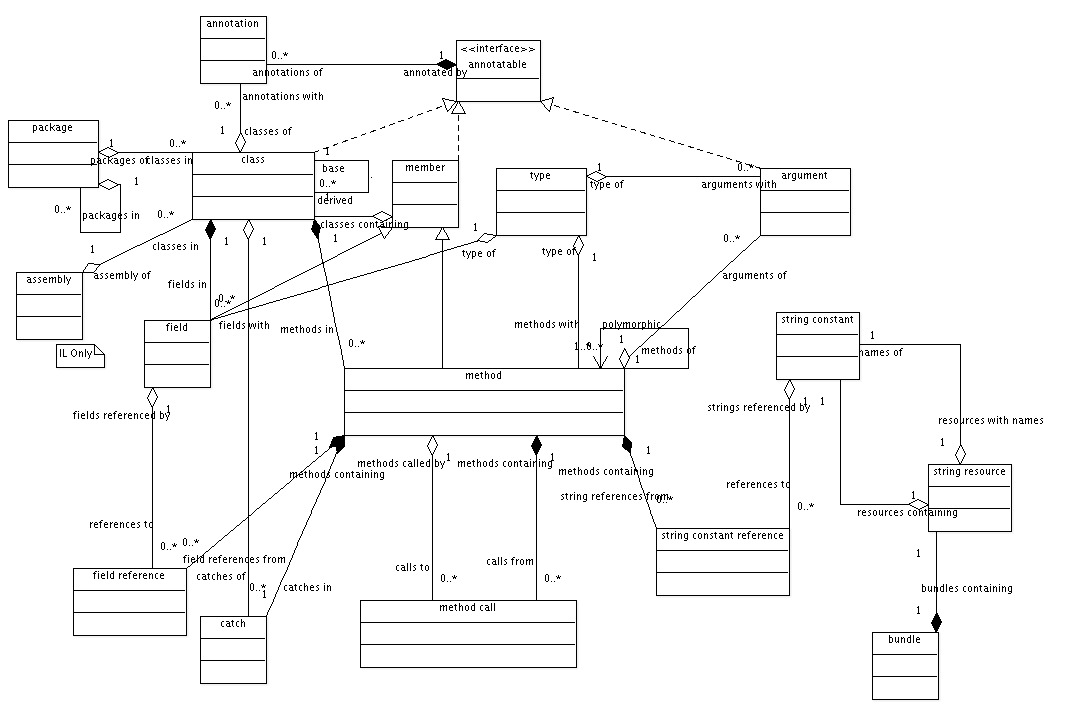- annotations of — Returns any annotations of an element in the system
- annotations with — Returns all the annotations where the annotation class is the class supplied
- any class — Returns classes in any namespace/package with a given name
- arguments of — Returns the arguments of the methods in the set
- arguments with — Returns all the arguments with the types in the set
- base classes of — Returns the base classes of the classes in the set
- calls from — Returns the set of all method calls found in a set of methods
- calls to — Returns the set of all calls to methods in a set
- cast — Converts a set of objects to a known type
- catches in — Returns the exception catches in a method
- catches of — Finds catches of an exception class
- classes in — Returns the classes in a set of packages, or the inner classes within a set of classes
- derived classes of — Returns the classes which are immediately derived from the classes in the set
- fields in — Returns the fields in the classes in the set
- fields with — Returns all the fields with the types in the set
- methods in — Returns the methods in the classes in the set
- methods with — Returns all the methods returning the types in the set
- packages in (Java)/namespaces in (C#-CIL) — Returns the packages or namespaces nested in the packages or namespaces in the set
- polymorphic — Returns the set of methods that map polymorphically to the input set
- recursive — Recursively apply a transform, and possibly a secondary transform
- recursive base classes of — Returns the base classes of the classes in the set, and the base classes of those classes, to the root of the inheritance hierarchy
- recursive derived classes of — Returns the derived classes of the classes in the set, and the derived classes of those classes, recursively
- references from — Returns the set of all field references found in a set of methods
- references to — Return references to a string constant or a field
- resources containing — Finds the string resource that's value is a given string constant
- resources with names — Finds the string resource that's name is a given string constant
- same — A transform that leaves the set unchanged
- string references from — Returns the set of all string constant references found in a set of methods
- uncorrelated — Change members of a set to another, specified set
- unique — Remove duplicate elements in a set
Transforms change a set into another set. You apply a transform
to the result of a set expression or another transform
by putting it in front. methods in
is a transform that changes a set of classes to the set of methods
in those classes; applying it to the set expression
class "ObjectDB"
results in this set expression that returns the set of methods in that class:
methods in class "ObjectDB"
Many transforms and value expressions represent the relationships between objects in the BBQ database; use these to traverse the relationships to get to your desired object type.

Transforms can be combined with other transforms with set operators.
This example returns a set of the derived classes of Persistent
together with the class itself.
( derived classes of union same ) class "Persistent"
Transforms can be used as arguments to some special operators
(exists, group of,
recursive)
to create new filters, value expressions or transforms. The following example
makes a filter
from the fields in transform,
to make a set expression that shows all the classes in package com.antlersoft.odb
that don't contain any fields.
not exists ( fields in ) classes in package "com.antlersoft.odb"